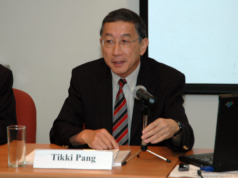ANGELES CITY – “With a competent and responsible head at the Environment and Management Bureau (EMB), the sufferings of people and businesses from harmful foul smell emitted by piggeries may find a definitive solution.”
Thus said the Pinoy Gumising Ka Movement (PGKM) and the Kruzada Kontra Amoy (KKA) as EMB Regional Director Engr. Carlos Magno affirmed studies that piggeries like those in Porac town have “adverse effects” on human beings.
“The study you furnished this office contains literature discussing the adverse effects of pig waste on human health if not properly mitigated and managed. We do not dispute anything in the study and we interpose no objection to you in using the said study for any legal purpose it may serve,” said Magno in a letter to PGKM Chairman Ruperto “Perto” Cruz. The PGKM, KKA and other residents vowed to file a class suit against owners of piggeries in Barangays Sta. Cruz and Manibaug Paralaya should they persist in “polluting the environment and cause danger to the very lives of the residents.”
The PGKM gave the EMB a copy of the study entitled “Backyard and Commercial Piggeries in the Philippines: Environment Consequences and Pollution Control Options.”
The study said it “found that people living near hog farms suffered from significantly higher levels of upper respiratory and gastrointestinal ailments than those living near cattle farms or in non-livestock farming community. Furthermore, well water testing results showed higher levels of nitrates in wells near hog farms posing risks to infants below 6 months old.”
It also said that “Those people who were also living near hog farms suffered from headaches, runny noses, sore throats, excessive coughing, diarrhea and burning eyes,” adding that “high levels of nitrogen (released by pig waste) in drinking water increase the risk of methemoglobinemia or, more commonly known as the blue baby syndrome.”
Catholic nuns running a school for special children in Barangay Sinura have complained to the EMB of the “high incidence of respiratory ailments” among their wards and the reported “increase in birth defects and miscarriages” in the area.
The same study also cited the adverse effects of piggeries on nearby businesses.
“The stench from uncontrolled, ill-disposed and untreated hog waste has been found to depress the real estate values of properties near hog farms,” it said.
Cruz co-owns the Royal Golf and Country Club (RGCC) at the boundaries of this city and Porac.
Magno, for his part, said “that going over the study we found that the same was conducted in Majayjay, Laguna.” He added that the study points out that “with the decentralization of government, the greater responsibility of monitoring compliance and environment quality now lies on the local government.”
The PGKM earlier assailed Porac Mayor Roger Santos for his lack of “political will” to stop the operation of at least 10 piggeries in the two villages.
Thus said the Pinoy Gumising Ka Movement (PGKM) and the Kruzada Kontra Amoy (KKA) as EMB Regional Director Engr. Carlos Magno affirmed studies that piggeries like those in Porac town have “adverse effects” on human beings.
“The study you furnished this office contains literature discussing the adverse effects of pig waste on human health if not properly mitigated and managed. We do not dispute anything in the study and we interpose no objection to you in using the said study for any legal purpose it may serve,” said Magno in a letter to PGKM Chairman Ruperto “Perto” Cruz. The PGKM, KKA and other residents vowed to file a class suit against owners of piggeries in Barangays Sta. Cruz and Manibaug Paralaya should they persist in “polluting the environment and cause danger to the very lives of the residents.”
The PGKM gave the EMB a copy of the study entitled “Backyard and Commercial Piggeries in the Philippines: Environment Consequences and Pollution Control Options.”
The study said it “found that people living near hog farms suffered from significantly higher levels of upper respiratory and gastrointestinal ailments than those living near cattle farms or in non-livestock farming community. Furthermore, well water testing results showed higher levels of nitrates in wells near hog farms posing risks to infants below 6 months old.”
It also said that “Those people who were also living near hog farms suffered from headaches, runny noses, sore throats, excessive coughing, diarrhea and burning eyes,” adding that “high levels of nitrogen (released by pig waste) in drinking water increase the risk of methemoglobinemia or, more commonly known as the blue baby syndrome.”
Catholic nuns running a school for special children in Barangay Sinura have complained to the EMB of the “high incidence of respiratory ailments” among their wards and the reported “increase in birth defects and miscarriages” in the area.
The same study also cited the adverse effects of piggeries on nearby businesses.
“The stench from uncontrolled, ill-disposed and untreated hog waste has been found to depress the real estate values of properties near hog farms,” it said.
Cruz co-owns the Royal Golf and Country Club (RGCC) at the boundaries of this city and Porac.
Magno, for his part, said “that going over the study we found that the same was conducted in Majayjay, Laguna.” He added that the study points out that “with the decentralization of government, the greater responsibility of monitoring compliance and environment quality now lies on the local government.”
The PGKM earlier assailed Porac Mayor Roger Santos for his lack of “political will” to stop the operation of at least 10 piggeries in the two villages.




